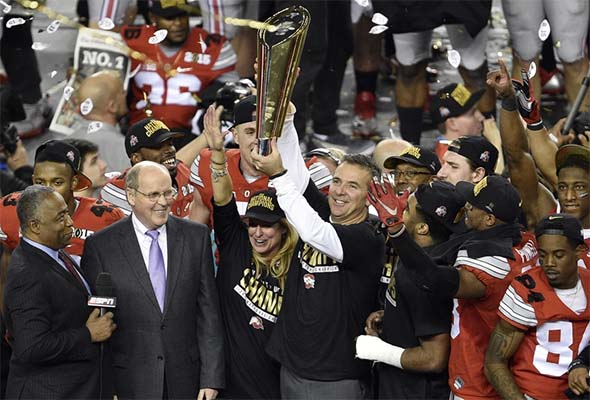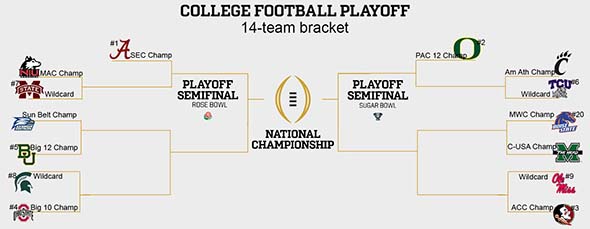Advocates for a college football championship playoff may feel vindicated after the inaugural playoff championship game earlier this week. The #4 ranked Ohio State Buckeyes defeated the #2 ranked Oregon Ducks with a decisive three-score victory. They did this after also defeating the #1 ranked Alabama Crimson Tide in the first round of the playoff.
For years, fans of college football and critics of the BCS (Bowl Championship Series) have been complaining that leaving the championship eligibility up to a subjective vote of a committee is inherently unfair. These fans and critics have long proposed a playoff system that would allow more teams to compete for the national title. This year, that playoff finally happened, and teams had to actually play for their right to be in the title game. The fourth-seeded team - a team that would have been left out of the Championship in the previous BCS-selection process - beat both of the teams that would have been in the vote-based title game, and won the championship.
This outcome is still not without controversy. The age-old argument of "our school got snubbed" has not gone away. After watching Ohio State run the tables in the playoff, the coaches, players, and fans of both Baylor and TCU had to have thought "that could have been us!" They may very well be right. Both teams were left out of the playoff due to misfortunes of mathematics. Even though Alabama (#1), Oregon (#2), Ohio State (#4), Baylor (#5), and TCU (#6) all finished the regular season with only one loss, Baylor and TCU had one fewer win on account of having played fewer games. Only Florida State (#3) finished the regular season with a perfect record (and they weren't even ranked #1!).

#4 Ohio State defeated #1Alabama and #2 Oregon to become 2014's national champions.
While the playoff did consist of the four "winningest" teams in the country, Baylor and TCU didn't have an opportunity to win as many games. Part of this is their fault, since the individual schools do have the privilege of setting their own schedules. Had Baylor and TCU scheduled an extra non-conference game (possibly even one against a Division II school), they could very well have been 12-1 along with 'Bama, Oregon, and Ohio State. But they didn't.
A hypothetical playoff-selection conundrum
Time to get into the "what ifs": what if TCU and Baylor had played (and won) an extra game and ended the season 12-1? In that case, the selection of undefeated Florida State would still seem like an obvious pick for one of the four playoff spots. But the remaining three would have been a much more subjective selection between the remaining five teams. Alabama and Oregon probably would still have gotten the next two spots due to coming from better conferences with a stronger strength of schedule. That would leave the fourth spot up to a subjective selection from the voters with only circumstantial metrics for them to judge with (final scores, this abstract concept of "quality losses", strength of schedule, etc).
Going even further: what if the regular season ended with five (or more) undefeated teams (one team from each of the "power five" conferences)? Or what if there's five (or more) 12-1 teams, all from supposed "power conferences"? And what if they all lost a game to each other? How would the playoff-eligible teams be decided?
The fundamental problem behind the BCS selection process is thus exposed: it's a subjective popularity contest. Teams that are given the opportunity to compete are determined (at least in part) by the personal biases of an arbitrary committee -- all of whom have personal and professional ties to the very schools they may be choosing from. I'm not saying that these aren't men of integrity, or that they shouldn't be trusted. I'm only saying that there may be some conflict of interest.
Expansion is inevitable, but still broken
Eventually, this selection process is going to come back under the microscope of unhappy fans, and the NCAA will have to expand the playoff-selection process. Maybe they increase it to six teams with a bye based on seed, or maybe it will be an eight team single-elimination tournament.
A 6 or 8 team playoff would have allowed Baylor and TCU (both 11-1) to compete for the championship.
But this still doesn't resolve the underlying, fundamental problem: the selection process is subjective and arbitrary. No matter how many teams we include in the playoff, there will always be the possibility of a team or two (or more) being snubbed by voters. Unless of course, the entire league competes in a tournament...
This selection model has other problems. For one thing, the bias of the voters is more likely to give preferential treatment to teams with established histories of winning. Or to teams from conferences with greater prestige. So true "Cinderella stories" of a team coming from nowhere to win the championship -- something that happens often in college basketball, and which fans love about that game -- are less likely as long as there are more established teams competing for the same playoff spot.
Teams from the MAC, Mountain West, Conference USA, or so on, who have a single standout season are very likely to be snubbed by voters if there's an SEC or PAC team that can fill that spot. This may be true even if the MAC, MW, or C-USA team actually is better. Their conference schedule is never going to be as difficult as an SEC or PAC schedule, so strength of schedule isn't going to tip the scale in favor of the hypothetical "Cinderella team". At least not without major upheavals in the power balance in the nation. Only a complete collapse of the power schools at an organizational level will cause such upheaval.
A proposed playoff model
So how do we get around this problem? Simply expanding the number of teams doesn't really solve the underlying problem as long as the teams eligible are still subject to a vote. So we need a more systematic method of picking teams. The NFL may offer a reasonable model. I suggest the NCAA implement a playoff model that takes the conference champions and gives them automatic seeds in the playoff.
There are currently ten BCS conferences: American Athletic, ACC, Big 12, Big 10, Conference USA, MAC, Mountain West, PAC-12, SEC, and Sun Belt WAC. Giving an automatic bid to the champion of each conference would give us a playoff of at least ten teams, and we'd probably want a couple more spots for wildcards and independent schools such as Notre Dame, BYU, and Army. Wildcards could be determined by a power ranking, or we could go by the AP poll rankings (if we want to maintain the value of those polls). With 2 wild cards, we could have a 12-team playoff very similar to the NFL's playoffs. First-round byes could go to the top 4 teams regardless of whether they were conference champs (which also maintains some value in the AP polls), and there would be three rounds of playoffs before the championship.

A proposed 12-team playoff similar to the current NFL playoff model.
Depicts the 2014 conference champs and 2 wild cards, with top 4 teams receiving 1st-round bye.
Considering how large the NCAA is, we would probably want to include more wild cards. This is especially important early on, since it keeps more of the Top 25, non-conference-leader teams in the running. The next alternative would be a 14-team, 3-round bracket with only two first-round byes going to the top 2 teams. This playoff would feature four wild card teams.

A proposed 14-team playoff bracket with 4 wild cards, and the top 2 teams receive first round byes.
After that, would be a 16-team, 3-round model with 6 wildcards and without any first-round byes. Every team would play in the first round. This is similar to the college basketball tournament, except that it is half the size - we go straight to the "sweet 16". Larger playoffs are also possible, but they would require more rounds of play. I think that three rounds is probably as much as we would want to go, since football is such a demanding sport. We also don't want to extend the college football season into February and have the college playoffs competing with the NFL playoffs, the SuperBowl, and with other college sports.
UPDATE: 7 FEBRUARY, 2018:
I have gotten criticisms for the above proposals on the grounds that the playoff that I have proposed is too big and takes too long. Unless the Bowl games are eliminated, a 3-week playoff would push the college football season to the end of January. This is a valid criticism.
If three weeks of playoffs is just too much (and it very well might be), then one final "compromise" option would be a smaller 8-team playoff. This could give an automatic playoff bid to each of the "power five" conferences (ACC, Big Ten, Big 12, PAC, and SEC), and then reserve automatic-qualifying spots for at least one non-power-five conference (American Athletic, C-USA, MAC, Mountain West, or Sun Belt), while still having room for one or two wild cards. The non-power-five conference champ(s) with the best record could be chosen for the sixth (and maybe seventh) spot, with the remaining bracket position(s) being filled in by a wild card or two (which could be an independent school).
This playoff model would guarantee that at least one non-power-five school has an opportunity to compete with the big dogs each year, and one or two more may have a [long] shot at a wild card slot. This is a compromise that I would be willing to accept for the sake of playoff brevity. Eventually, if the non-power-five conferences become more competitive (maybe even win a championship or two), then the automatic qualification for the power-five conferences could (and should) be lifted. At that point, the playoff would be seeded with the top six conference champs (from any conference) and two wild cards or independents, or expanded out into one of the larger models outlined above.
The long-term, big picture...
The proposed playoff models do have some downsides. First and foremost is the simple fact that there isn't currently parity between the conferences. There would be a period early on that would see a lot of very one-sided playoff games. Over the long-term, we may see the competition get better.
Right now, it is very difficult for lower-tier schools to recruit high-caliber prospects. This is due to many reasons, but the two most significant reasons are that it limits the player's national exposure (and thus, his chances of being drafted into the NFL), and it makes it virtually impossible for such a player to play on a championship team. Even if a weaker school does land some diamonds in the rough and has a break-out season, they still have a very hard time entering the conversation for the national championship. Such schools have a lot of barriers to overcome:
- "They haven't played any good teams",
- "Their conference is weak",
- "Can they really compete with the big dogs?"
- and so on...
Weaker schools have to overcome the voters' preference for teams with long histories of winning, and we hear these same excuses year in and year out. Some might even dismiss such a school as a "one year wonder" or a "fluke". But isn't that the whole point of having an annual championship? If you're looking for the best teams over a longer period, then why aren't we only having playoffs and championships every three or four years, taking only the best-performing teams during the respective time period?
The college football championship isn't about picking the best average team over a long period of time; it's about picking the best team this year. Less-established schools don't have five or ten years to establish themselves. When they have a breakout, diamond-in-the-rough, Cinderella team, they need that recognition now. Historically, even in cases where a team has maintained Cinderella status over several years, they have still been snubbed.
Remember a few years ago when Boise State went several seasons without losing? They accumulated a 50-3 record over the span of four years (the first NCAA football team to win 50 games in four seasons), and their quarterback, Kellen Moore, became the winningest QB in NCAA history. They were literally breaking records for winning in college football. That team never had a chance to play in the BCS championship game. Could they have won? That's debatable. Could they have been competitive? I would say, probably yes. But we'll never know because they never had the chance to play.

Kellen Moore graduated as the winningest quarterback in NCAA D-1 history, and led Boise State to
an unprecedented 50-3 record over 4 years. But that team was snubbed for a national title bid.
Having a playoff that automatically seeds conference champs means that teams like those elite Boise State teams would at least have the opportunity to earn a championship appearance and play for their opportunity to win it all. Every team in the nation would have a legitimate opportunity to make a championship run in any given season. If all the stars align, and a team like lowly UNLV (my alma mater) puts together a conference championship team, then even they would have a chance at the title -- without having to maintain that success for several years to "prove themselves" to voters. I'm not going to hold my breathe for that though.
An automatic playoff bid would also help to bring more money into the lower-performing conferences. The money can be used to improve facilities, hire better staff, and help make those teams more competitive at an organizational and infrastructure level. Over the course of time, this would allow some of the better schools in traditionally weaker conferences to recruit better players with the promises of more playing time (since the depth chart may have less top-tier competition), a good chance at a conference championship and automatic playoff bid, and at least a chance to go for a national title. Within ten years or so, we might start to see the whole nation become more competitive. It might even start to happen as soon as four or five years. And honestly, who doesn't want to see more competitive games across the board? I certainly do!
In addition, removing the subjective vote from the playoff seeding minimizes or eliminates the need for winning teams to run up scores to "impress voters". Teams winning one-sided games can put in backups earlier, giving younger players more opportunities to gain in-game experience and develop, and reducing the risk of major injuries for starters in noncompetitive games.
I firmly believe that [in the long run] widening the breadth of competition, and opening up the title game to "lower tier" conferences and schools will eventually result in a more competitive league overall. Having a playoff system that has more rigid qualification rules - as opposed to relying on subjective votes - also solves the problem of champion-caliber "Cinderella teams" being arbitrarily snubbed. If teams are going to be snubbed, at least they should be snubbed with mathematical consistency, rather than the whims of some potentially-biased voters. It's a pretty dramatic change that could ultimately reshape the NCAA football landscape. It will likely be very ugly at the start, but I think it is the direction that the league should go. And this change should start sooner, rather than later.